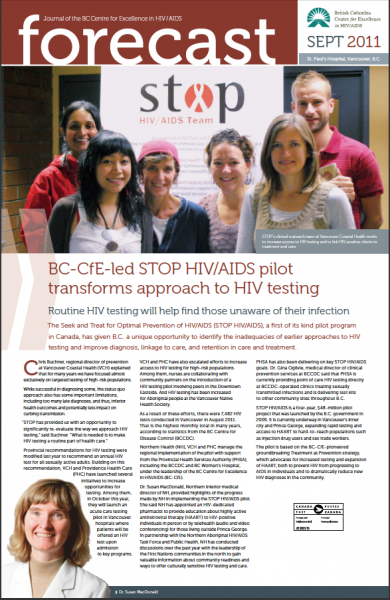BC-CfE-led STOP HIV/AIDS pilot transforms approach to HIV testing
Routine HIV testing will help find those unaware of their infection
 The Seek and Treat for Optimal Prevention of HIV/AIDS (STOP HIV/AIDS), a first of its kind pilot program in Canada, has given B.C. a unique opportunity to identify the inadequacies of earlier approaches to HIV testing and improve diagnosis, linkage to care, and retention in care and treatment.
The Seek and Treat for Optimal Prevention of HIV/AIDS (STOP HIV/AIDS), a first of its kind pilot program in Canada, has given B.C. a unique opportunity to identify the inadequacies of earlier approaches to HIV testing and improve diagnosis, linkage to care, and retention in care and treatment.
Chris Buchner, regional director of prevention at Vancouver Coastal Health (VCH) explained that for many years we have focused almost exclusively on targeted testing of high-risk populations.
While successful in diagnosing some, the status quo approach also has some important limitations, including too many late diagnoses, and thus, inferior health outcomes and potentially less impact on curbing transmission.
“STOP has provided us with an opportunity to significantly re-evaluate the way we approach HIV testing,” said Buchner. “What is needed is to make HIV testing a routine part of health care.”
Provincial recommendations for HIV testing were modified last year to recommend an annual HIV test for all sexually active adults. Building on this recommendation, VCH and Providence Health Care (PHC) have launched several initiatives to increase opportunities for testing. Among them, in October this year, they will launch an acute care testing pilot in Vancouver hospitals where patients will be offered an HIV test upon admission to key programs.
VCH and PHC have also escalated efforts to increase access to HIV testing for high-risk populations. Among them, nurses are collaborating with community partners on the introduction of a HIV testing pilot involving peers in the Downtown Eastside. And HIV testing has been increased for Aboriginal people at the Vancouver Native Health Society.
As a result of these efforts, there were 7,482 HIV tests conducted in Vancouver in August 2011. That is the highest monthly total in many years, according to statistics from the BC Centre for Disease Control (BCCDC).
Northern Health (NH), VCH and PHC manage the regional implementation of the pilot with support from the Provincial Health Services Authority (PHSA), including the BCCDC and BC Women’s Hospital, under the leadership of the BC Centre for Excellence in HIV/AIDS (BC-CfE).
Dr. Susan MacDonald, Northern Interior Medical Director of NH, provided highlights of the progress made by NH in implementing the STOP HIV/AIDS pilot. She said NH has appointed an HIV-dedicated pharmacist to provide education about highly active antiretroviral therapy (HAART) to HIV-positive individuals in person or by telehealth (audio and video conferencing) for those living outside Prince George. In partnership with the Northern Aboriginal HIV/AIDS Task Force and Public Health, NH has conducted discussions over the past year with the leadership of the First Nations communities in the north to gain valuable information about community readiness and ways to offer culturally sensitive HIV testing and care.
PHSA has also been delivering on key STOP HIV/AIDS goals. Dr. Gina Ogilvie, medical director of clinical prevention services at BCCDC said that PHSA is currently providing point of care HIV testing directly at BCCDC-operated clinics treating sexually transmitted infections and is delivering test kits to other community sites throughout B.C.
STOP HIV/AIDS is a four-year, $48-million pilot project that was launched by the B.C. government in 2009. It is currently underway in Vancouver’s inner city and Prince George, expanding rapid testing and access to HAART to hard-to-reach populations such as injection drug users and sex trade workers.
The pilot is based on the BC-CfE-pioneered groundbreaking Treatment as Prevention strategy, which advocates for increased testing and expansion of HAART, both to prevent HIV from progressing to AIDS in individuals and to dramatically reduce new HIV diagnoses in the community.
